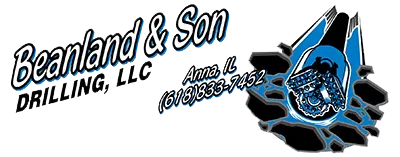Frequently Asked Questions
Curious to learn more about Beanland & Son‘s drilling and water pump services?
Do you have questions about our well pumps, water filtration system, or well drilling services? If so, then check out some of our frequently asked questions below. However, if your question is not on this list, then give us a call and one of our professionals will be able to answer your specific question.
Usually, they do not go dry. However, if your well is not producing water, this typically can be a pump issue, a screen issue, or another issue.
The depth of your well can have an effect on the quality of your water. This is because the deeper the well, the further away your water is from potential pollutants or ground contaminants.
Since our local area is blessed with an abundance of water, where we drill wells usually depends on where the customer wants it, while still ensuring that our equipment can fit into that area
Cost of new wells depends on several factors. This includes the depth of the drill, the size of the water tank and pump, and whether it’s a conventional system or a constant pressure system.
On average, the life span of a water pump can last between 15-18 years. However, it can be less due to a variety of factors. One of these factors is the water pump’s duty cycle, which plays a large role in the lifespan of the pump. A duty cycle is how often the water pump runs throughout the entire day. Water sediment, quality of installation, size of the pump, motor quality, and type of pump can all also determine the lifespan of your water pump.
When drilling a new well for a home, we make sure to include everything that is needed to get water into the house and ready to be hooked up. If we are installing a replacement well, we also provide everything you need to hook it back up to your home.
The depth of your well will depend on several factors including location, elevation, and formations underground. Local experience and knowledge can help a driller decide the appropriate depth of your well.
Raw water is the water that is taken directly from the well. This water can be either have a low PH or be hard water. Some well water can contain iron, hydrogen sulfide gas (sulfur), or some less common contaminates. These water contaminates can usually get filtered out. However, in some cases a filtration system is not required.
The size of the pump system depends on a variety of things including the use of the system, amount of water available to pump, and the depth of the well itself. Also, the size of the pump system can depend on the flow that is needed and the amount of water pressure that you require.
On average it takes one day to drill a well.
You will want to test your well for bacteria at least once a year. However, if you believe you are in a high-risk area, you may need to have it occur more frequently. Also, if your water changes smell or color, this can indicate that your water is contaminated.
Make sure to first check for a blown fuse or a tripped breaker. This is a common enough occurrence and can usually be a simple fix. However, if neither your breaker nor fuse has been blown out or tripped, then you need to address the issue with a certified contractor. If you are dealing with this issue, make sure to contact us and our team will help assist you!
By state law, only a licensed pump installer or driller can legal inspect water wells for real estate transactions. The inspection should include the water well capacity, compliance, condition, location, and/or performance of a pressure system and well.

